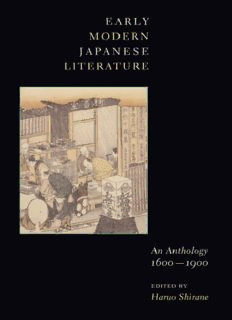
Early Modern Japanese Literature: An Anthology, 1600-1900 PDF
Preview Early Modern Japanese Literature: An Anthology, 1600-1900
Early Modern Japanese Literature TRANSLATIONS FROM THE ASIAN CLASSICS Translations from the Asian Classics EDITORIAL BOARD Wm. Theodore de Bary, Chairman Paul Anderer Irene Bloom Donald Keene George A. Saliba Haruo Shirane David D. W. Wang Burton Watson Early Modern Japanese Literature AN ANTHOLOGY, 1600–1900 Edited with Introductions and Commentary by Haruo Shirane TRANSLATORS James Brandon, Michael Brownstein, Patrick Caddeau, Caryl Ann Callahan, Steven Carter, Anthony Chambers, Cheryl Crowley, Chris Drake, Peter Flueckiger, Charles Fox, C. Andrew Gerstle, Thomas Harper, Robert Huey, Donald Keene, Richard Lane, Lawrence Marceau, Andrew Markus, Herschel Miller, Maryellen Toman Mori, Jamie Newhard, Mark Oshima, Edward Putzar, Peipei Qiu, Satoru Saito, Tomoko Sakomura, G. W. Sargent, Thomas Satchell, Paul Schalow, Haruo Shirane, Jack Stoneman, Makoto Ueda, Burton Watson COLUMBIA UNIVERSITY PRESS NEW YORK Columbia University Press wishes to express its appreciation for assistance given by the Japan Foundation toward the cost of publishing this book. Columbia University Press wishes to express its appreciation for assistance given by the Pushkin Fund toward the cost of publishing this book. Columbia University Press Publishers Since 1893 New York Chichester, West Sussex cup.columbia.edu Copyright © 2002 Columbia University Press All rights reserved E-ISBN 978-0-231-50743-1 Library of Congress Cataloging-in-Publication Data Early modern Japanese literature : an anthology, 1600–1900 / [edited with introduction by Haruo Shirane]. p. cm.—(Translations from the Asian classics) Includes bibliographical references and index. ISBN 0-231-10990-3 (cloth : alk. paper) I. Shirane, Haruo, 1951–II. Series. PL782.E1 E23 2002 895.6’08003—dc21 2001053725 A Columbia University Press E-book. CUP would be pleased to hear about your reading experience with this e-book at cup- [email protected]. CONTENTS Preface Historical Periods, Measurements, and Other Matters 1. Early Modern Japan The Shōgunate and the Domains The Social Hierarchy The Economy and the Three Cities The Licensed Quarters The Courtesans and Female Entertainers Literacy, Scholarship, and Printing Women, Readership, and Literature Warrior and Urban Commoner Attitudes Popular and Elite Literatures Periodization 2. Kana Booklets and the Emergence of a Print Culture Parodies The Dog Pillow Book (Inu makura) Fake Tales (Nise monogatari) Edict Against Christianity Humorous Stories Today’s Tales of Yesterday (Kinō wa kyō no monogatari) Dangerous Things in the World The Woman Who Cut Off Her Nose Asai Ryōi Tales of the Floating World (Ukiyo monogatari) Preface Regarding Advice Against Wenching Hand Puppets (Otogi bōko) The Peony Lantern Military Stories O-An’s Stories (Oan monogatari) 3. Ihara Saikaku and the Books of the Floating World Ihara Saikaku Life of a Sensuous Man (Kōshoku ichidai otoko) Putting Out the Light, Love Begins Afterward “Honored” Is Added to Their Names Aids to Lovemaking: Sailing to the Island of Women Saikaku’s Tales from Various Provinces (Saikaku shokokubanashi) The Umbrella Oracle Five Sensuous Women (Kōshoku gonin onna) The Calendar Maker’s Wife Life of a Sensuous Woman (Kōshoku ichidai onna) An Old Woman’s Hermitage Mistress of a Domain Lord A Monk’s Wife in a Worldly Temple A Teacher of Calligraphy and Manners A Stylish Woman Who Brought Disaster Ink Painting in a Sensual Robe Luxurious Dream of a Man Streetwalker with a False Voice Five Hundred Disciples of the Buddha—I’d Known Them All Great Mirror of Male Love (Nanshoku ōkagami) Though Bearing an Umbrella Tales of Samurai Duty (Bukegiri monogatari) In Death They Share the Same Wave Pillow Japan’s Eternal Storehouse (Nippon eitaigura) In the Past, on Credit, Now Cash Down The Foremost Lodger in the Land A Feather in Daikoku’s Cap All the Goodness Gone from Tea Worldly Mental Calculations (Seken munezan’yō) In Our Impermanent World, Even Doorposts Are Borrowed His Dream Form Is Gold Coins Holy Man Heitarō Ejima Kiseki and the Hachimonjiya Characters of Old Men in the Floating World (Ukiyo oyaji katagi) A Money-Loving, Loan-Sharking Old Man 4. Early Haikai Poetry and Poetics Matsunaga Teitoku and the Teimon School Kitamura Kigin The Mountain Well (Yama no i) Fireflies Nishiyama Sōin and Danrin Haikai Okanishi Ichū Haikai Primer (Haikai mōgyū) 5. The Poetry and Prose of Matsuo Bashō Bashō and the Art of Haikai Hokku Composing Haiku Combining Intermediaries Single-Object Poetry Greetings Overtones The Art of Linked Verse Reverberation Link Status Link Withering Gusts (Kogarashi) Plum Blossom Scent (Ume ga ka) The Poetics of Haiku Awakening to the High, Returning to the Low Following the Creative Object and Self as One Unchanging and Ever-Changing Haibun The Hut of the Phantom Dwelling (Genjūan no ki) Narrow Road to the Deep North (Oku no hosomichi) 6. Chikamatsu Monzaemon and the Puppet Theater Early Jōruri and Kabuki Chikamatsu Monzaemon The Love Suicides at Sonezaki (Sonezaki shinjū) The Drum of the Waves of Horikawa (Horikawa nami no tsutsumi) The Battles of Coxinga (Kokusenya kassen) The Heike and the Island of Women (Heike nyogo no shima) The Love Suicides at Amijima (Shinjū ten no Amijima) Hozumi Ikan Souvenirs of Naniwa (Naniwa miyage) 7. Confucian Studies and Literary Perspectives Song Confucianism Nakae Tōju Dialogue with the Elder (Okina mondō) On the Virtue of Filial Piety Confucian Views of Literature Yamazaki Ansai Japanese Lesser Learning (Yamato shōgaku) Ando Tameakira Seven Essays on Murasaki Shikibu (Shika shichiron) The Intentions of the Author Chinese Studies and Literary Perspectives Itō Jinsai The Meaning of Words in the Analects and the Mencius (Gomō jigi)
Description: